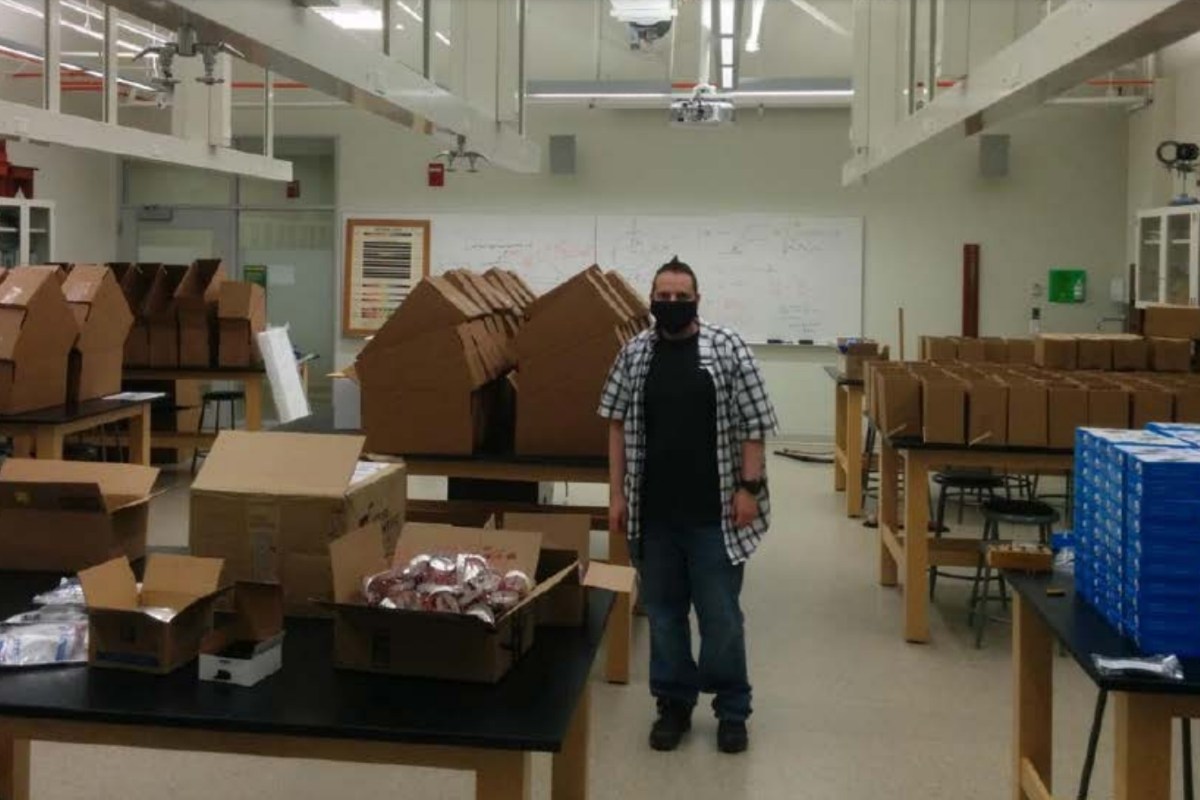
Department of Physics laboratory staff member Taylor Rogers packs lab kits for distribution to undergraduate physics students. Photo supplied.
Instructors in the University of Albeta’s Department of Physics are ensuring that even during the COVID-19 pandemic, undergraduate students continue to have opportunities to engage in hands-on science with a take-home lab kit initiative.
“The take-home lab kits contain eight experiments, packed into boxes and sent out to students across the globe. The idea is to provide compact undergraduate-level experiments at an affordable price for the students,” said James Pinfold, professor in the Department of Physics who is leading the initiative alongside faculty members Marie-Cécile Piro and Juan Pablo Yañez. “We like to call it ‘the little box of big physics.’”
Pinfold explains that in order to keep prices down, the experiments often utilize objects and materials available in the home or that can be easily and affordably purchased from supermarkets and pharmacies.
The experiments range from determining the thickness of a hair using laser diffraction—with a cheap and safe laser pen—to measuring the speed of sound using a tuning fork, and much more. The kits have been sent to University of Alberta students as far away as India and China.
Pinfold credits a few sources of inspiration for the initiative. Even before the COVID-19 pandemic, he was organizing outreach work pioneering the placement of cosmic ray detectors in a number of Alberta high schools, seeking to involve students in the excitement of fundamental research.
“I also worked with a collaborator, Bobby Acharya, at the Abdus Salam International Centre for Theoretical Physics (ICTP) in Italy,” said Pinfold. “We resolved to develop an innovative set of experiments to demonstrate physics at the cutting-edge that were compact, low cost, non-trivial and could easily be carried out in a home, or at least outside of a fully equipped university lab.”
Those outreach initiatives would serve as the catalyst for these at-home lab kits—and when COVID-19 restrictions made it clear that students would need to study online, Pinfold and the lab staff began adapting the ideas for use in undergraduate courses.
“Lorne Roth and Taylor Rogers, our department laboratory staff, are key members of our team. They led the ordering of the necessary equipment as well as assembling the kits and preparing them for postage,” said Pinfold.
The opportunity for hands-on learning, Pinfold explains, is critical to student success.
“Experiment is the basis for all science, and ‘do-it-at-home’ experiments require more from the student than a usual university lab. Students have to adapt the experiment to their home environment, sometimes using materials at hand, they have no lab partner, have no teaching assistant in the room,” said Pinfold. “But at the same time, it really provides a better training ground to test initiative, skill and ability to improvise all of which are key prerequisites of an experimenter. The skills will help make these students stronger, more confident scientists.”
The take-home lab kits are in use in PHYS 294 (General Physics Laboratory), PHYS 295 (Experimental Physics I), and PHYS 292 (Experimental Physics for Engineers), serving roughly 100 students. Pinfold is continuing to develop the program, planning to refine a low-cost version to support physics education in other places around the world.
The global COVID-19 pandemic has required a mass migration to the digital world, and post-secondary learning is no exception. The University of Alberta is delivering course content primarily remotely in the Fall 2020 and Winter 2021 semesters. While delivery may look different, what remains the same is our strong commitment to an engaging and quality education and experience for our students.